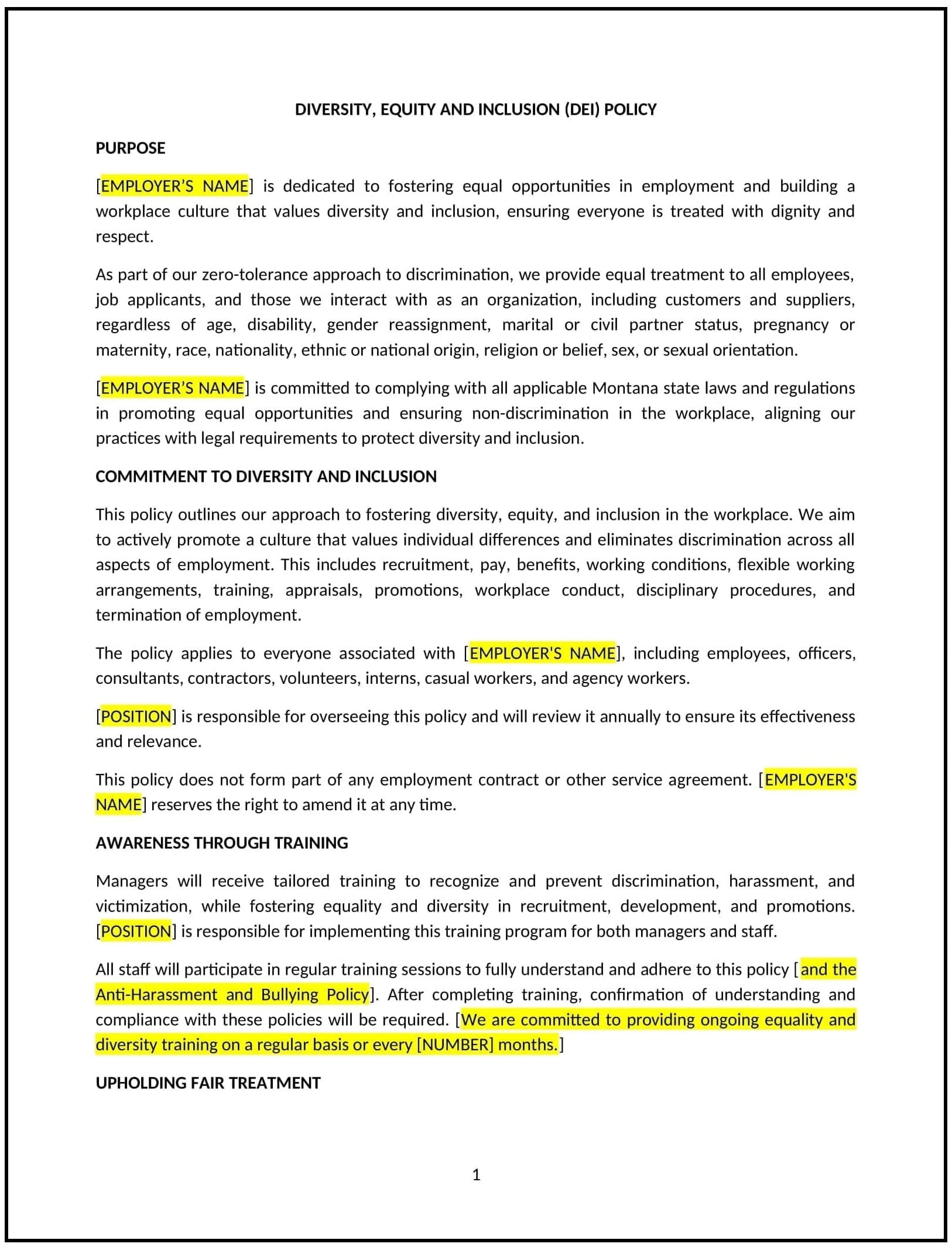Diversity, equity, and inclusion (DEI) policy (Montana): Free template
Got contracts to review? While you're here for policies, let Cobrief make contract review effortless—start your free review now.

Customize this template for free
Diversity, equity, and inclusion (DEI) policy (Montana)
A diversity, equity, and inclusion (DEI) policy helps Montana businesses foster a welcoming, fair, and inclusive workplace by promoting diversity in hiring, training, and day-to-day operations. This policy outlines the business’s commitment to creating an environment where employees from all backgrounds feel respected, valued, and supported.
By implementing this policy, businesses can attract a diverse talent pool, improve employee satisfaction, and enhance innovation while adhering to ethical and legal standards regarding diversity, equity, and inclusion.
How to use this diversity, equity, and inclusion (DEI) policy (Montana)
- Define diversity, equity, and inclusion: Businesses should clearly define what diversity, equity, and inclusion mean within the context of their organization, including the importance of race, gender, age, sexual orientation, disability status, and other factors.
- Establish inclusive hiring practices: The policy should outline steps to ensure hiring practices are equitable, such as using diverse interview panels, removing bias from job descriptions, and ensuring equal opportunity for all candidates.
- Promote equal pay and advancement opportunities: Businesses should commit to providing equal pay for equal work and offer fair opportunities for career growth and advancement to all employees.
- Foster an inclusive workplace culture: Businesses should encourage an environment where employees feel respected and valued, where discrimination and harassment are actively discouraged, and where diverse perspectives are heard.
- Provide DEI training and education: Businesses should offer training programs to employees at all levels to raise awareness about unconscious bias, microaggressions, and other DEI-related issues. This training should be updated regularly.
- Address grievances and complaints: Businesses should outline a procedure for employees to report discrimination, harassment, or any other issues related to DEI, ensuring that these concerns are handled promptly and confidentially.
- Review and update regularly: Businesses should periodically evaluate the effectiveness of their DEI policies and programs, making adjustments as necessary to ensure continuous improvement and alignment with business goals.
Benefits of using this diversity, equity, and inclusion (DEI) policy (Montana)
This policy provides several key benefits for Montana businesses:
- Enhances employee engagement and satisfaction: A diverse and inclusive workplace promotes a positive culture where employees feel valued, leading to higher job satisfaction and productivity.
- Increases innovation and creativity: Diverse teams bring a wider range of perspectives and ideas, which can drive innovation and creative problem-solving.
- Attracts top talent: A commitment to diversity and inclusion helps businesses attract a broader pool of qualified candidates, improving hiring outcomes and the quality of hires.
- Strengthens business reputation: Businesses known for their DEI efforts are viewed positively by customers, clients, and potential hires, enhancing their brand image and reputation.
- Reduces risk of legal issues: A strong DEI policy helps businesses minimize the risk of discrimination or harassment lawsuits, as it shows a proactive approach to fostering an inclusive environment.
- Promotes fairness and equal opportunity: By ensuring that all employees have access to the same opportunities, businesses can contribute to a more equitable society.
Tips for using this diversity, equity, and inclusion (DEI) policy (Montana)
- Communicate the policy clearly: Ensure that all employees understand the DEI policy and its objectives, and provide them with the resources to engage with DEI initiatives.
- Set measurable DEI goals: Businesses should establish specific, measurable goals related to diversity in hiring, employee retention, and advancement opportunities. These goals should be tracked and reported regularly.
- Foster an open dialogue: Encourage employees to engage in discussions about DEI, share their experiences, and provide feedback on how the company can improve.
- Hold leadership accountable: Business leaders should model inclusive behaviors, set an example for the rest of the organization, and be held accountable for meeting DEI objectives.
- Offer mentoring and sponsorship programs: Provide opportunities for employees from underrepresented groups to receive mentorship and career development support.
- Continuously assess and improve: Regularly assess the impact of DEI initiatives, track progress, and make improvements as needed to ensure the policy is having a positive impact.